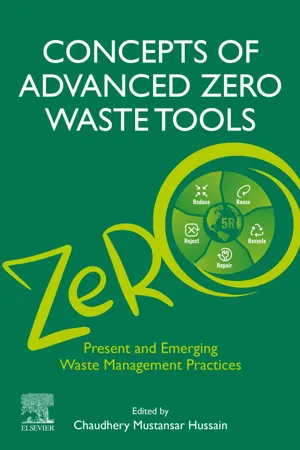
Concepts of Advanced Zero Waste Tools
Present and Emerging Waste Management Practices
- 276 pages
- English
- ePUB (mobile friendly)
- Available on iOS & Android
Concepts of Advanced Zero Waste Tools
Present and Emerging Waste Management Practices
About This Book
Advanced Zero Waste Tools: Present and Emerging Waste Management Practices, Volume One in the Concepts of Advanced Zero Waste Tools series addresses the fundamental principles of zero waste that encourages the redesign of resource lifecycles so that products are reused. By promoting reuse and recycling, as well as prevention and product designs that consider the entire product lifecycle, the zero waste philosophy advocates for sustainability and environmental management and protection. This book takes the first step toward addressing the tools needed to implement zero waste, both on a practical and conceptual scale.
In addition to environmental and engineering principles, the book also covers economic, toxicologic and regulatory issues, making it an important resource for researchers, engineers and policymakers working toward environmental sustainability.
- Uses fundamental, interdisciplinary and state-of-the-art coverage of zero waste research to provide an integrated approach to tools, methodology and indicators
- Covers current challenges, design and manufacturing technology, and sustainability applications
- Includes up-to-date references and web resources at the end of each chapter, as well as a webpage dedicated to providing supplementary information
Frequently asked questions
Information
Table of contents
- Cover image
- Title page
- Table of Contents
- Copyright
- Dedication
- Contributors
- About the editor
- Series preface to first edition
- Preface
- Chapter One: The realm of zero waste technology: The evolution
- Chapter Two: Zero waste certification
- Chapter Three: Zero waste manufacturing
- Chapter Four: Challenges, issues, and problems with zero-waste tools
- Chapter Five: Application of poultry industry waste in producing value-added products—A review
- Chapter Six: Zero waste hierarchy for sustainable development
- Chapter Seven: Application of advanced technologies in managing wastes produced by leather industries—An approach toward zero waste technology
- Chapter Eight: Modern society and zero waste tools
- Chapter Nine: Toward “Zero Liquid Discharge” industrial facilities: Reducing the impact on freshwater resources by reusing industrial and urban wastewaters
- Chapter Ten: Conclusions
- Index